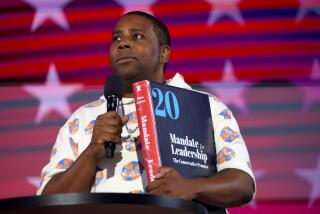2 Key Democrats Offer Proposals on Trade, Deficit
- Share via
WASHINGTON — In the wake of their party’s third presidential election defeat in a row, two leading Democrats--Sen. Bill Bradley of New Jersey and New York Gov. Mario Cuomo--emerged this week with proposals designed to shape the emerging economic policy debate and help revive their side’s lagging political fortunes.
Bradley, a pioneer in tax reform and in developing new schemes for Third World debt relief, proposed in a speech Thursday night in New York that the United States should move quickly to form a more closely knit economic coalition with seven other generally free-market nations on the Pacific Rim.
Recalling his old days as a basketball player, Bradley called for a “Pac 8” combination of the United States, Japan, Canada, Australia, Mexico, South Korea, Indonesia and Thailand to develop a high-level official forum where they could work together “to address the main threats to our economic security.”
But instead of attempting to form an exclusionary trading bloc, a threat that many fear is emerging from Europe’s plan to tear down all internal trade barriers by 1992, Bradley argued that the “dominant task should be to strengthen the multilateral system” under which most non-Communist nations have operated since the end of World War II.
The goal of such a new approach, Bradley suggested, would be to ensure that the United States does not lose out to Japan in its ability to take advantage of the burgeoning economic growth in the Pacific basin and to enable the advanced countries in the trading region to play a more activist role in restoring the health of Third World debtors.
Bradley proposed three specific tasks for the Pacific coalition, which he called a “microcosm of the world.”
He recommended that the eight nations develop a consensus position on farm and natural resource trade issues to present a common front in the current round of global trading negotiations.
He also proposed that they establish a “Pacific currency regime to reduce yen-dollar volatility” and urged a new framework for aiding debtor nations, with particular emphasis on restoring economic growth in Mexico.
Cuomo, in a speech Tuesday night in New York, recommended that Democrats in Congress should go along--for one year--with President-elect George Bush’s effort to reduce the budget deficit without a tax increase. In return, he suggested that they should demand that the Gramm-Rudman budget law, which calls for a balanced budget in four years, be modified so that in future years its automatic trigger mechanism also would include a method of imposing higher taxes along with spending cuts.
Contending that Bush’s proposed “flexible freeze” on spending cannot work without causing “Draconian and undesirable cuts in badly needed domestic programs . . . and in defense systems already in production,” Cuomo nonetheless proposed that Congress should work with Bush to implement spending cuts that would at least get next year’s deficit under the $110-billion ceiling called for by the budget law.
While Bush may be able to accomplish that goal in his first year in office, Cuomo suggested, it would be politically impossible to continue along the same path to reach future deficit targets. One way to force the White House to bargain on equal terms with Congress, he said, would be by “adding a trigger tax to Gramm-Rudman (that) makes it a more potent weapon--and therefore a sharper incentive.”
More to Read
Get the L.A. Times Politics newsletter
Deeply reported insights into legislation, politics and policy from Sacramento, Washington and beyond. In your inbox twice per week.
You may occasionally receive promotional content from the Los Angeles Times.










